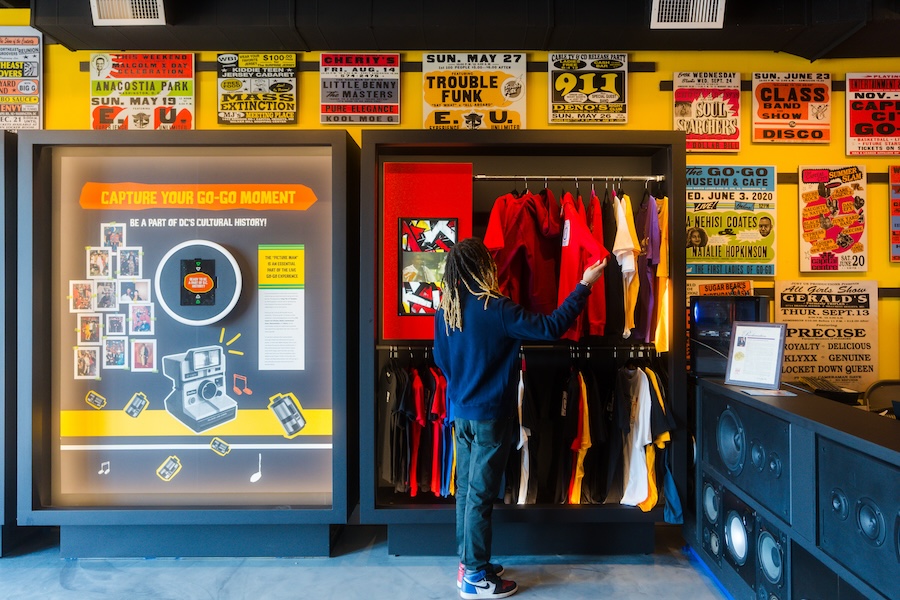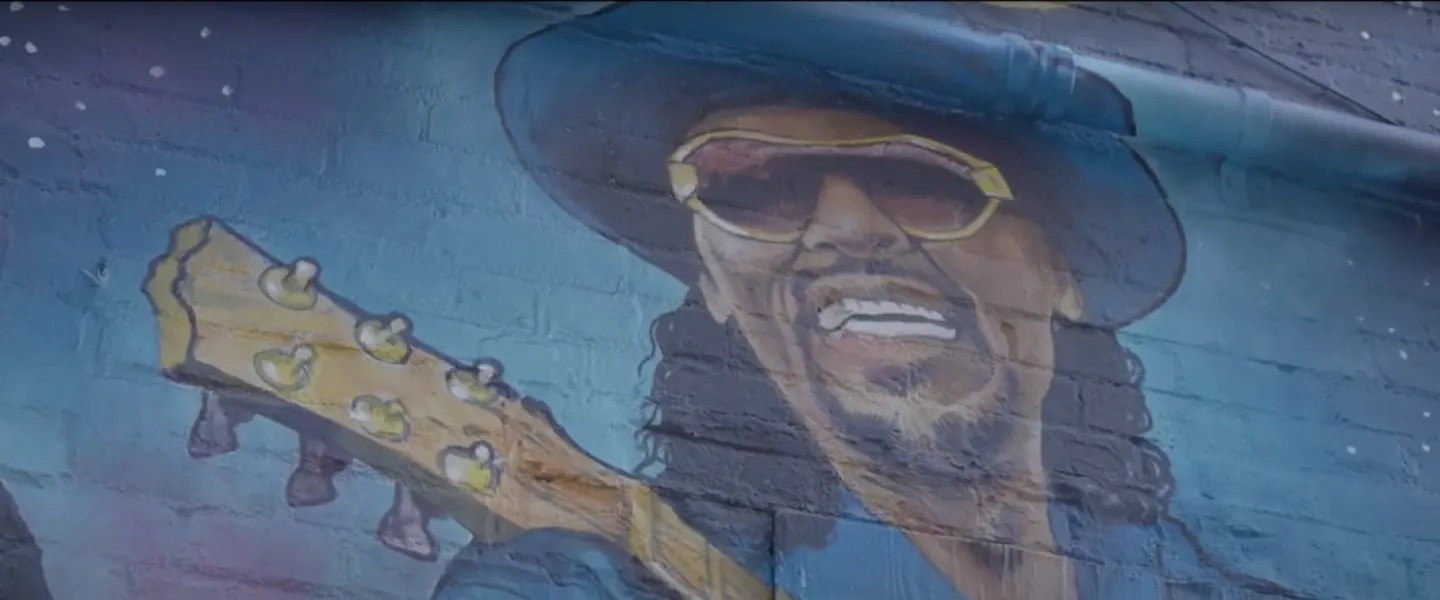The official music of the city has a fascinating history, but its story is far from finished.
Musical genres are rarely created in a single moment in time; instead, sounds blend gradually over years of performances, as artists and groups comingle and embark on sonic adventures inspired by each other’s continued forays into the unknown. The sound can then spread locally, then regionally, then nationally, depending on where groups travel and the genre’s ability to penetrate the zeitgeist.
DC’s go-go music stands apart from other strands of American music in that it never achieved the national recognition it deserves, and its origins can arguably be traced back to one man. In no way does this take away from the music’s power, though; in fact, from the perspective of DC locals, it only strengthens the bond between the beat of the music and the city that created it.
Make sure to visit the new Go-Go Museum & Cafe, the official site for the appreciation, study and preservation of go-go music.
Rhome Anderson
"Go-go was our indigenous music and … had the heart of any kid who grew up in DC."
Roots
The Beat Don’t Stop, a feature-length documentary by TV One on the genre, traces the founding of go-go music in DC to a formative moment in a club called the Maverick Room in the city’s Edgewood neighborhood sometime around 1974. A musician named Chuck Brown was grooving with his band, the Soul Searchers, and decided he wanted his percussionists to continue playing in between songs so the dancing never ceased.
In time, Brown became “The Godfather of Go-Go” (although bands like Black Heat and the Young Senators also deserve credit for laying the foundation) and created the “pocket,” which is the signature groove of the music, connotating the rhythmic interplay between the drummer, conga players and additional percussionists. While the beat ebbs and flows, the vocalist then begins a call-and-response with the crowd, allowing for an array of shout-outs and creating a wholly communal atmosphere.
Inside its grooves, go-go contains multitudes: the smoothness and sexiness of soul and jazz; the slap-bass of funk; the powerful rhythm of R&B; the call-and-response of gospel. It is a music of celebration and participation, as go-go truly thrives with a crowd to dance to the groove and respond to the singer’s proclamations.
In the Groove
In 1978, Brown released “Bustin’ Loose” as a single and soon, the song had hit the Billboard charts. Over the next few years, a vibrant go-go music scene emerged across the District. Brilliant Black musicians, many of whom had attended local high schools and participated in epic marching band competitions, formed large groups featuring keyboards, horns and strings, in addition to the essential percussion instruments.
However, aside from brief moments in the cultural limelight, including an unsuccessful 1986 studio film entitled Good to Go starring Art Garfunkel (of all people), singles like the aforementioned “Bustin’ Loose” and Experience Unlimited’s “Da Butt” (featured in Spike Lee’s 1988 film School Daze) and the 1987 Go-Go Live concert in front of a packed Capital Centre (a venue in Landover, Md. usually reserved for national acts), DC’s go-go music never captured the attention of the masses the way it could have thanks to an array of factors.
During go-go’s initial surge, the city embraced its potential. Mayor Marion Barry’s Summer Youth Employment Program inspired teens to bring instruments and bond over the music, while DC’s Department of Parks and Recreation even drove bands around in “Showmobiles,” allowing groups to perform free go-go concerts in multiple neighborhoods during the summer months.
Resisting Calls for Quiet
Unfortunately, as the 1980s wore on, drug use and violence became part of the District’s story, as the crack epidemic ravaged the region, which led to confrontations at concerts that would spill over into the streets. Although wider systematic issues were at play, lawmakers began to openly blame go-go concerts for the city’s strife. Curfews were instituted, clubs refused to let go-go bands perform and gradually, hotbeds for the music were shut down. School budgets in the city also shrank, causing music education programs to go under, cutting off a vital breeding ground for the city’s go-go musicians and the sense of community they were able to build. Instead of embracing an art form that served as an outlet away from the troubled streets, critics made go-go music a scapegoat.
Even in the face of criticism and governmental interference, DC’s bond with the music has never ceased. Local radio stations still play marathon late night go-go sessions, “Bustin’ Loose” has become a mainstay at local sporting events and acts such as Chuck Brown (who passed away in 2012) and Rare Essence are iconic institutions. And in 2019, another vital chapter was added to go-go’s story.
A Metro PCS store in DC’s Shaw neighborhood had been known for years for its embrace of go-go, with the distinctive music playing throughout the day. However, thanks to the complaint of a resident at a nearby luxury apartment complex, the store’s owner was forced to mute the music. Washingtonians responded en masse with rallies and live music, leading to the coining of the #DontMuteDC hashtag by a Howard University student. The store unmuted the music just days later, and by February 2020, Mayor Muriel Bowser had signed a bill that made go-go the official music of DC. The mayor’s office has committed to implementing programs that will preserve and perpetuate go-go music, along with the incredible culture and history the music has built.

Go-Go Today
While veteran and up-and-coming bands (like Go-Go Symphony and Rare Essence) play venues all across the city, the genre has entered an exciting new era with a brick-and-mortar gathering place that honors its history and culture: the Go-Go Museum & Cafe in Anacostia. The cafe is slated to open in the spring. The interactive museum is just as focused on the future as it is on the past, planning to host concerts several days a week – Tiny Desk-style inside and block-party vibes on the back patio.
Whether you groove to go-go at home, at the museum or out on the town, the genre continues to unify and uplift listeners as it has for generations, uniting those who grew up with this homegrown and historic art form and those encountering it for the first time.
Additional Resources
‘Go-go, the funky, percussive music invented in Washington, D.C.’ – The Smithsonian National Museum of American History, June 9, 2015
‘The History of Go-Go: A 6-Step Guide to the Essentials’ – Washingtonian, Oct. 30, 2019
‘Go-go is signed into law as the official music of D.C.’ – The Washington Post, Feb. 19, 2020
‘Go-go is making headlines again. Now it’s time for a history lesson.’ – The Washington Post, June 17, 2020









































































